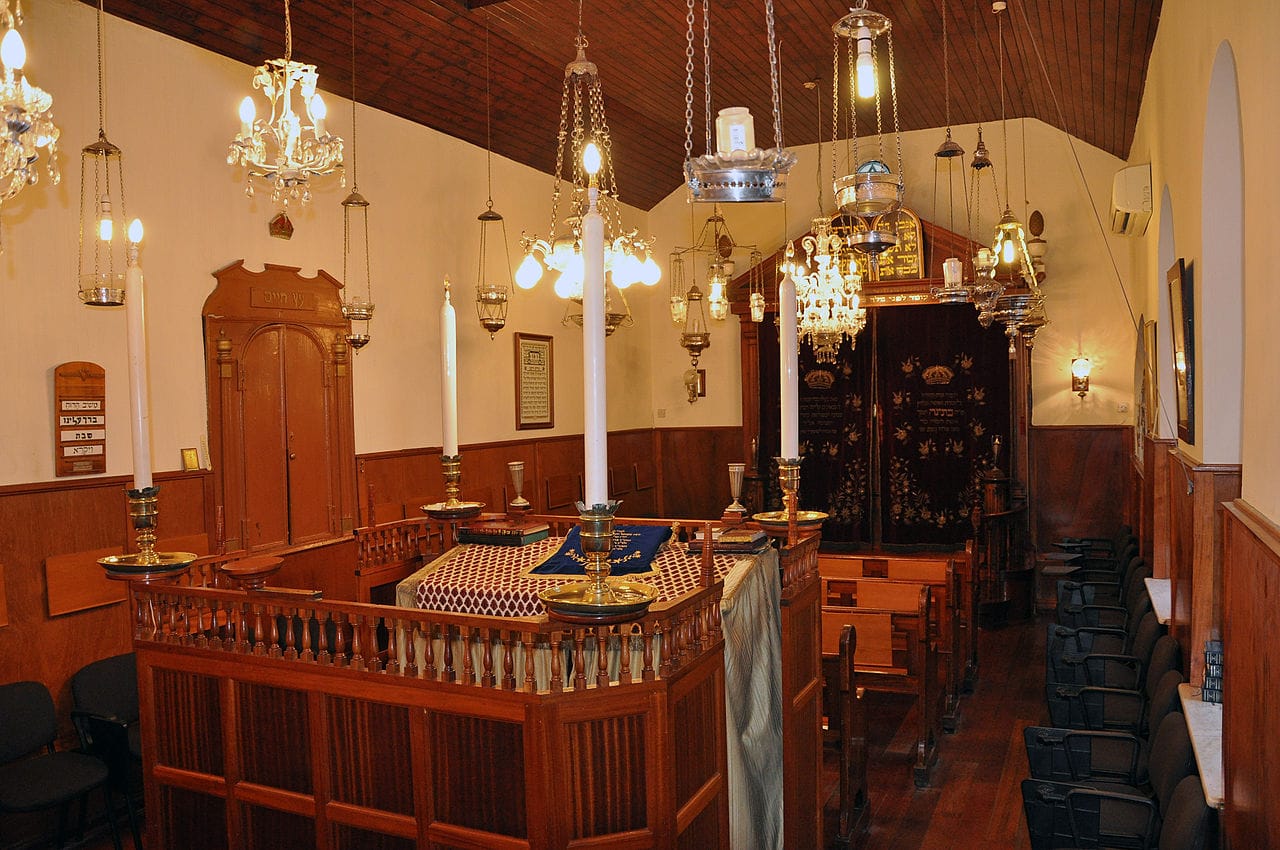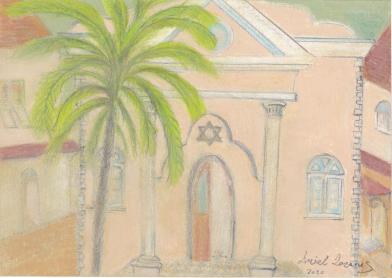Cantor James Levy
Linked by Melody: Gibraltar/Moroccan Songs for Passover (and Shavuoth)
Among the unique recordings by James Levy of Gibraltar/Morocco is the pairing of two different songs sharing melodies that, on the surface, appear to be only loosely connected. Associated by Levy to the holydays of Passover and Shavuoth, he adds that these songs were performed after Birkat Hamazon (the Grace of the Meal) on the festive meal of the day of Passover, namely in a function similar to the Sabbath zemirot that are more characteristic of Ashkenazi Jews. A more detailed inquiry into these texts reveals an affinity that explains their melodic pairing.
The two texts differ in their language, theme and genre. The first “song” is in fact a collection of biblical verses (Psalms 115: 16; Jeremiah 17: 7; Psalms 29: 11; Psalms 118: 1) sung in the original Hebrew and in Judeo-Spanish translation in alternation.
בְּרוּכִים אַתֶּם ליְיָ עושה שמיים וארץ (תהילים קטו, 16)
בָּרוּךְ הַגֶּבֶר אֲשֶׁר יִבְטַח בַּיהוָה וְהָיָה יְהוָה מִבְטַחוֹ (ירמיהו יז, 7)
יְהוָה עֹז לְעַמּוֹ יִתֵּן יְהוָה יְבָרֵךְ אֶת עַמּוֹ בַשָּׁלוֹם (תהלים כט, 11)
הודו לה' כי טוב כי לעולם חסדו (תהילים קי"ח, 1)
This selection is similar to the biblical verses composing the last paragraph of the Grace of the Meal according to the Sephardi tradition, as follows:
יְראוּ אֶת יְיָ קְדֹשָׁיו, כִּי אֵין מַחְסוֹר לִירֵאָיו. כְּפִירִים רָשׁוּ וְרָעֵבוּ, וְדֹרְשֵׁי יְיָ לֹא יַחְסְרוּ כָל טוֹב. הוֹדוּ לַיְיָ כִּי טוֹב, כִּי לְעוֹלָם חַסְדּוֹ. פּוֹתֵחַ אֶת יָדֶךָ, וּמַשְׂבִּיעַ לְכָל חַי רָצוֹן. בָּרוּךְ הַגֶּבֶר אֲשֶׁר יִבְטַח בַּיְיָ, וְהָיָה יְיָ מִבְטַחוֹ. נַעַר הָיִיתִי גַּם זָקַנְתִּי, וְלֹא רָאִיתִי צַדִּיק נֶעֱזָב, וְזַרְעוֹ מְבַקֶּשׁ לָחֶם. יְיָ עֹז לְעַמּוֹ יִתֵּן, יְיָ יְבָרֵךְ אֶת עַמּוֹ בַשָּׁלוֹם.
O fear the Lord, ye his holy ones; for there is no want to them that fear him. Young lions do lack and suffer hunger: but they that seek the Lord shall not want any good. O give thanks unto the Lord, for he is good: for his lovingkindness endureth for ever. Thou openest thine hand, and satisfiest every living thing with favor. Blessed is the man that trusteth in the Lord, and whose trust the Lord is. I have been young and now I am old; yet have I not seen the righteous forsaken, nor his seed begging for bread. The Lord will give strength unto his people; the Lord will bless his people with peace.
The opening verse in Levy’s performance is part of the Hallel Psalms, a feature of the Passover Haggadah as well as of the festive liturgy for this holyday. Interestingly, Levy’s own transcription of this text (item 203 in the collection, see attached PDF) differs somehow from what he sings. In any case the selection fits the ending of the Grace of the Meal when, according to Levy, these verses were sung with this particular melody.
However, there is an additional reason for this pairing. The second text recorded by Levy, sung to the same melody as the biblical verses, is the Judeo-Spanish biblical romance/copla labeled by scholars La consagración de Moisés. Based on Exodus 3: 2-5, it relates the encounter of Moses the shepherd with burning bush in Mount Horeb. As most of these biblical passages set by anonymous authors into romance verses, the text, most probably intended for pedagogical purposes, includes also midrashic references.
Specifically, this text belongs to a cycle of several romance/coplas widespread in Western Mediterranean traditions, and most especially north Morocco, centered on episodes from the life of Moses. Most of these songs include as a refrain, or end with the opening verse of Psalm 118 in Hebrew (Hodu l’Adonay ki tov, ki le’olam hasdo) followed by its Ladino translation (Alabado sea su nombre/porque siempre bien nos dió/y en los cielos y en la tierra/su merced nunca faltó). Put differently, this textual connection of the romance/copla with the Psalm explains its melodic pairing with the end of the Grace of the Meal and/or the Hallel.
Levy sings the distinctive North Moroccan version, the area where this romance is fondly remembered and performed around the festivities of Passover and Shavuoth due to its content clearly connecting it with the events leading through the ten plagues to the exit from Egypt. This Judeo-Spanish song has been profusely documented in different variants and is assiduously performed in commercial recordings. Hereby follows a version recorded by JMRC scholar Susana Weich-Shahak from Ms. Ester Creciente, born in Tetuán. It was recorded in Ramat Eliyahu on 28.3.1979 (NLI, Sound Archive Yc1494/17) and will appear in the near future in Weich-Shahak’s forthcoming publication Judeo-Spanish Songs for the Year Cycle in our series Anthology of Music Traditions in Israel.
Mose salió de Misraim huyendo del rey Paróh,
se fue derecho a Midián y se encontró con Ytró.
Le dió a Sipora, su hija, porque era temiente a Dió.
Mose, paciendo el ganado que su suegro le entregó.
Moise, paciendo el ganado, al monte de Horeb llegó,
viera ardir una zarza, la zarza no se quemó.
Moise se cubrió sus ojos, temiendo ver a Dió,
oyó una voz que decía: - Moshe, Moshe, mi siervo,
descalzate tus zapatos, que en lugar santo estás tú:
te irás derecho a Misraim y dirás al rey Par'ó
que te entregue las llaves de mi pueblo, el hebreo,
y si no te las entregare, castigarle quiero yo
con diez plagas que le mande pa' que sepa quién soy yo.
Hodu l'Adonai ki tov ki le'olan hasdó;
alabado sea su nombre porque siempre bien nos dió
y en los cielos y en la tierra su merced nunca faltó.
Literal translation by Edwin Seroussi
Moses went out of Egypt fleeing from king Pharaoh
Went directly to Midian and encountered Jethro,
He (Jethro) gave him Tzipora, his daughter, because he was God-fearing,
Moses was tending to his flock which his father-in-law presented him,
Moses was tending to his flock arrived to Mount Horeb
Seeing a bush burning, a bush not extinguishing.
Moses covered his eyes fearing to see God
Heard a voice saying: “Moses, Moses, my servant”
Take off your shoes You are in a holy site.
You shall go straight to Egypt and you shall tell king Pharaoh
To give you the keys of my people, the Hebrew one.
And if he will not give them to you I wish to punish him
With ten plagues that I will send to him so that he will know who I am.
Hodu l'Adonai ki tov ki le'olam hasdo;
Praised be His name because of his continuing goodness
And in heaven and earth his lovingkindness never failed us.






